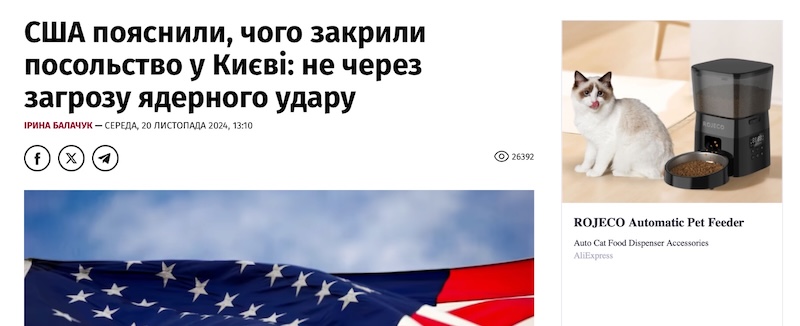Dramatic decontextualization
A point that Neil Postman makes in Amusing Ourselves to Death is that our modern entertainment-based media can’t have a serious discussion when you have to cut to an irrelevant, peppy commercial in the next ten seconds.
Here’s an even more extreme example from a leading Ukrainian newspaper’s website:

The headline is talking about the US embassy in Kyiv and a nuclear threat right next to an ad for an automatic cat feeder. I guess the cat’s not going to feed itself after a nuclear blast, but really?
Besides the completely absurd mismatch of the ad and the headline, there are two other points about entertainment as news culture in this screenshot.
Why do we need a meaningless stock photo of an enormous American flag? It adds nothing to the story. To see how news could be, take a look at the text-only NPR site. It’s no frills, but there’s a gravitas there that stock photos and automatic cat feeders can’t impart.
The reason I haven’t translated the headline itself yet is that it’s a convoluted mess. It reads, “USA explains, why the embassy in Kyiv was closed: not because of the threat of a nuclear strike.” The last of the three lines in the screenshot reads “threat of a nuclear strike”; it’s only buried in the middle of the second line that you get the negation of this. I don’t think this is just bad editing. It’s intentionally dramatic.
A much more informative and less alarmist headline would have been, “US Embassy in Kyiv denies closure is due to nuclear strike rumors”. This has the added benefit of being shorter in both languages.
This isn’t a one off thing. Making everything into dramatic entertainment is so ubiquitous that’s hard to imagine a media environment without it.